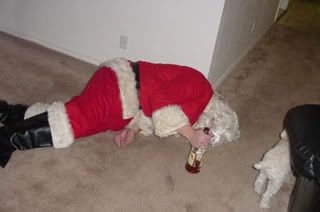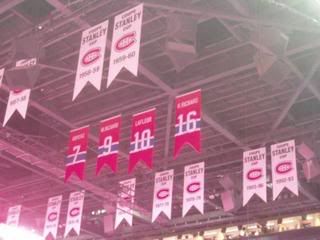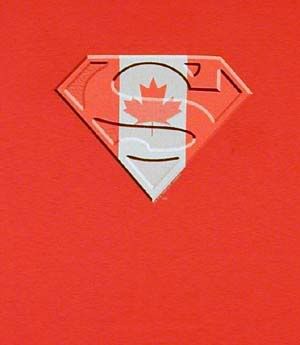Holiday ho-ho-hold the posting

So, I'm out of time for this calendar year. There's just too much going on for me to sit down and write anything worthwhile about the Leafs. I'll be back in the New Year. In the meantime, a few quick thoughts:
1.) I'm tired of seeing Andrew Raycroft let in a bad goal every single game. I've read a lot of stories about how he's had a successful beginning to his Leafs career; I've read nothing addressing the fact that almost every time I've watched him play, he's let in a terrible goal. Like on Saturday night, for instance, against the Rangers. You know the one - the weak, spinning backhand the somehow found its way through Raycroft's five-hole. (Brother-in-law Vanny, after dumping his beer into his crotch: "That was - oh my god! That was the worst goal I think I've ever seen! How did he let that go in?" My sister: "Oh dear, that goalie is awful! I'll get you boys another drink.") It isn't just the bad goals - Raycroft cannot handle the puck at all, and I'm not noticing this just because Belfour was so good at it. Raycroft is unable to reliably stop the puck behind the net, frequently gets flustered when having to pass it to a teammate, and too often has sent it to an opposition player instead, has trouble playing the puck under pressure...he just doesn't look comfy back there at all with his passing game. I think that Leaf defensemen need to try harder to make it back into the zone to relieve the pressure from Raycroft, because he isn't capable of managing that aspect of the game. I have a horrible, creeping feeling that at some critical point this season, Raycroft is going to let down the team in spectacular fashion because of one of those weaknesses.
2.) It took 35 games before Hal "Skill" Gill had a bad game for Toronto, December 19th's implosion against the Panthers - and the boo-birds immediately came out of hibernation to dump all over the guy. It's like they were just waiting for him to mess up to give them their golden chance to take a collective crap on him. And it's true - before the season started, I thought that Gill would be the weakest link in the Leafs' defense, but I'm happy to report that I was wrong about Skill so far, and have in fact been pleasantly surprised with his play. Given how often other defensemen on the team have messed up this year without this kind of attention, I think Gill has earned a mulligan or two from the crowd.
3.) Steen: Time to wake up and do something, already. Prove to us that Ferguson wasn't a moron for keeping you instead of trading you for MVP candidate Chris Pronger.
4.) So the Penguins might be moving, and the word is hockey hotbed Kansas City might have the early line on landing the franchise, if they moved. No mention of Hamilton. What does it take for Canada to get a hockey team back? Will it ever happen under Bettman? I read this morning that Nashville gets $14 million a year under the "Toronto subsidizes the league" sharing plan. I'll bet Winnipeg or Quebec City would still have teams if they were given that kind of cash to boost their budgets. Here's hoping Bettman rings in the New Year with a tall glass of Polonium 210.
5.) Colin Campbell aired the idea of increasing the size of the nets to increase scoring, after noticing goal-scoring is down a little this year compared to last. Typically, Damien Cox agrees with the half-baked scheme, announcing that when a no-nothing like Jarome Iginla dares to suggest it's a bad idea, that it makes him "want to scream."
Here's what makes me want to scream. Reading Damien Cox present an illogical argument that contemplates TOTALLY CHANGING THE GAME, and making it sound like it's a proclamation from the mountain that a simpleton like an all-star hockey player wouldn't understand.
To summarize - Cox thinks bigger nets would be a good thing because goalies have grown larger over the years, and therefore, the integrity of NHL records would be preserved because this change would only restore the balance back to what it was in the days of Max Bentley, back when goalies were midgets, apparently.
He's wrong. Such a change would alter the game forever; if that ever happened, you might as well draw a line through the record book. In the NBA, players are dramatically bigger than they were 40 years ago. Are they going to make the nets bigger? Will baseball switch to aluminum bats to jack up home-run numbers?
Cox includes arrogant language in his contemplation like, "don't tell me" it would be an affront to the records, and "don't even try to argue," and "it's a fact" that Esposito saw more net than Cheechoo. He says all these things with absolutely no backing statistics at all.
It may well be true that goalies are larger these days - but he didn't cite anything proving it. Therefore, his argument is worthless, and sorry Cox, I'll argue all I want to.
Also - let's accept for a second that maybe goaltenders have gotten bigger over the years. What about the skaters? They have too. Why doesn't he propose making the rinks larger? And the advent of carbon-fibre sticks have enabled pluggers like Chad Kilger to own 106 mph slap-shots. Why hasn't that boosted scoring the way an egghead like Cox seems to want? What about the no-tolerance reffing policy - wasn't that supposed to increase scoring, too?

What the - what a stupid gift
that moron Cox gave me!
The top goalies in the game are all regular-sized guys. Hasek is all of 160 pounds, and he's still going strong at age 41, making his case for the Hall of Fame. Belfour, 6-feet, 180. Kiprusoff, Huet, Giguere - all top goalies of average size. Ryan Miller is listed at 166 pounds, for crying out loud. "Goalies are bigger, it's a fact" - really? Even if goalies averaged 6'3" now, and I'll bet money they don't, they aren't 6'3" wide. Where are all these giant, mutant goalies keeping the scoring down and ruining exciting hockey games? I can think of Luongo and Brodeur as above-average. Is this statistically significant?
Also, who says larger goalies automatically keep more shots out? What if a smaller guy is more nimble?
Goalies are more effective today because of many reasons - their equipment is much larger than in the old days, (a look at the tapes proves that without the need for any statistical backup) game preparation is better than it has ever been (credit Roger Neilson for introducing video-work in the back rooms, in addition to a team of advance scouts that could staff the security agency of a small country), systems coaching has improved, and most of all - goalies are just better at what they do. They've improved more over the last 20 years than skaters have, because they had so much more ground to make up. Remember "Red Light Racicot"? Remember Mike Palmateer when he attempted to skate? Any Leaf goalie before 1992? Players like those wouldn't make an AHL roster today.
But most of all, in years gone by, the goalie was a crazy bastard you never talked to, a nutjob who practised his craft off by himself in the corner, because if you were foolish enough to actually speak to him, you'd banish the mojo he'd conjured up from his latest chicken sacrifice and turn him into Allan Bester incarnate. Nobody wanted that, so goalies were the freak of the team who roomed by themselves, hid in toilet stalls before games, and who talked more to themselves than anyone else.
But not anymore. Goalies are indisputably the centre of every team, and some clubs have finally cottoned onto the idea that they should have their own coach to help keep them in top form. To point out how backwards most teams are in that regard, even today, most teams don't carry a coach dedicated to mentoring the goalie, but that's going to change. Toronto has one, Montreal has one, and so do a handful of others. In a few years, all teams will have one. These coaches are dedicated to mentoring the goaltenders, working on all aspects of their play, and therefore, the goalies will get even better. As an example, Ray Emery felt he could use a talent upgrade, so he spent the entire off-season in a dedicated hockey school in order to sharpen up, and you can't argue with the results so far. Spending your summer handling shooting drills was unheard of in the old days. Roberto Luongo was traded by Mike Keenan because he insisted on having his own goalie coach included as a contract clause; I guarantee you Vancouver doesn't mind having that guy on the payroll one bit.
My hunch is that this entire "make the net bigger" plot is yet another initiative cooked up by Bettman and his cronies to make the game appeal more to Americans. And therefore, adapt it at the expense of Canadian sensibilities. Do a survey - fans like scoring chances, not necessarily tons of goals. I never saw a formula on the blackboard that said, "more goals = better game".
And the truth is, nobody knows what would happen to the outcomes of games if the nets were enlarged, so for Cox to thoughtlessly blow off any concern as nothing to worry about - it's the definition of arrogance. Leave the nets alone, you bunch of clowns.
I had more to say tonight than I thought.
Hallelujah, holy shit! - where's the Tylenol.



